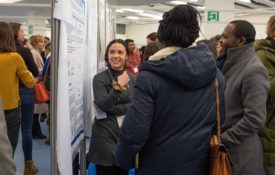-
A Psychologist Explains How AI and Algorithms Are Changing Our Lives
In an age of ChatGPT, computer algorithms and artificial intelligence are increasingly embedded in our lives, choosing the content we’re shown online, suggesting the music we hear and answering our questions. These algorithms may be changing our world and behavior in ways we don’t fully understand, says psychologist and behavioral scientist Gerd Gigerenzer, the director of the Harding Center for Risk Literacy at the University of Potsdam in Germany.
-
Love and the Brain: Do Partnerships Really Make Us Happy? Here’s What the Science Says
I’m Shayla Love, and you’re listening to Scientific American’s Science, Quickly. We’ve been talking about love this week, and so far we’ve maintained a pretty basic assumption: that love is good, that love makes us happier. But does it? And if so, does it bring the same amount of happiness to everyone? [CLIP: Ending music] ... Harry Reis: I’ve been studying relationships for about 40 years. Love: That’s Harry Reis, a professor of psychology at the University of Rochester. He told me that decades of work has found that partnered people are just, well, better off than un-partnered people.
-
How Your Beliefs Shape Reality
As you move through the world, it’s inevitable that your way of seeing things won’t always align with the people around you. Maybe you disagree with the way your neighbor raises her kids, or find your brother’s politics to be troubling. But you may not realize how much your core beliefs shape your perception of the world. This week, we talk with psychologist Jer Clifton about how our beliefs shape our reality — and how we can use this knowledge to live happier and more harmonious lives.As you move through the world, it’s inevitable that your way of seeing things won’t always align with the people around you.
-

“So Much Amazing Research”: Scholarship and Science Prevail at ICPS 2023
Nearly 1,500 researchers, students, and others came to the Belgian capital from more than 70 countries and six continents.
-

New Content From Current Directions in Psychological Science
A sample of articles on threat-related perceptual decision making, metacognitive myopia, learning one’s own genetic susceptibility to mental disorders, brain reward circuits, and much more.
-

Want More Generous Children? Show Them Awe-inspiring Art
Research is the first to demonstrate that awe-eliciting art can spark prosociality in children as young as 8 years old, motivating them to set aside their own concerns to focus on others. Awe also has physical benefits for children.

